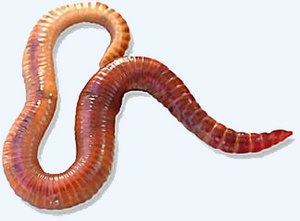Composting is one of the most common reasons for worm farming. Worms are used to compost waste and discarded material naturally and without adding to the local landfills. To do this, the worms eat fruit and vegetable scraps, along with other compostable items such as paper products, leaves, cotton rags and egg shells.
 Image via WikipediaIf composting is the primary reason for setting up a worm farm, choices should be made for the appropriate types of worms that are known as being the best for this option. The Red Wiggler, or Eisenia fetida, is reportedly the best worm for composting. These worms reproduce easily and are extremely hardy. The trait that makes them best as compost worms is their ravenous appetites.
Image via WikipediaIf composting is the primary reason for setting up a worm farm, choices should be made for the appropriate types of worms that are known as being the best for this option. The Red Wiggler, or Eisenia fetida, is reportedly the best worm for composting. These worms reproduce easily and are extremely hardy. The trait that makes them best as compost worms is their ravenous appetites. Because of their eagerness to devour anything edible, Red Wigglers produce a high quality substance resulting in a nutrient rich soil that is so desirable with worm farming.
Worms used for garden and lawn farming are typically available in sets of three different varieties of worms. The Red Wiggler and the Night Crawlers are often two of the types of worms in these sets. The third worm is usually Pheritema, or Florida Wiggler which are worms that burrow deep into the soil.
 Image via WikipediaOver 3000 varieties of worms exist. The worms mentioned here are the most commonly used and readily available on the market today. They can be found at various online distributors - even Amazon.com
Image via WikipediaOver 3000 varieties of worms exist. The worms mentioned here are the most commonly used and readily available on the market today. They can be found at various online distributors - even Amazon.comMost types of worms are typically made available as adult worms, young worms and egg capsules. Typically sold by the pound, the number of worms per unit will vary depending on their age and size. Egg capsules yield a higher number of worms per unit once hatched.
A worm farm will be most successful when the appropriate worm is chosen for the job at hand. While most worms will compost discarded items and waste and act as live bait, some have some small traits that make them the best choice for a worm farm with a particular purpose.
Worm Composting Resources:

No comments:
Post a Comment